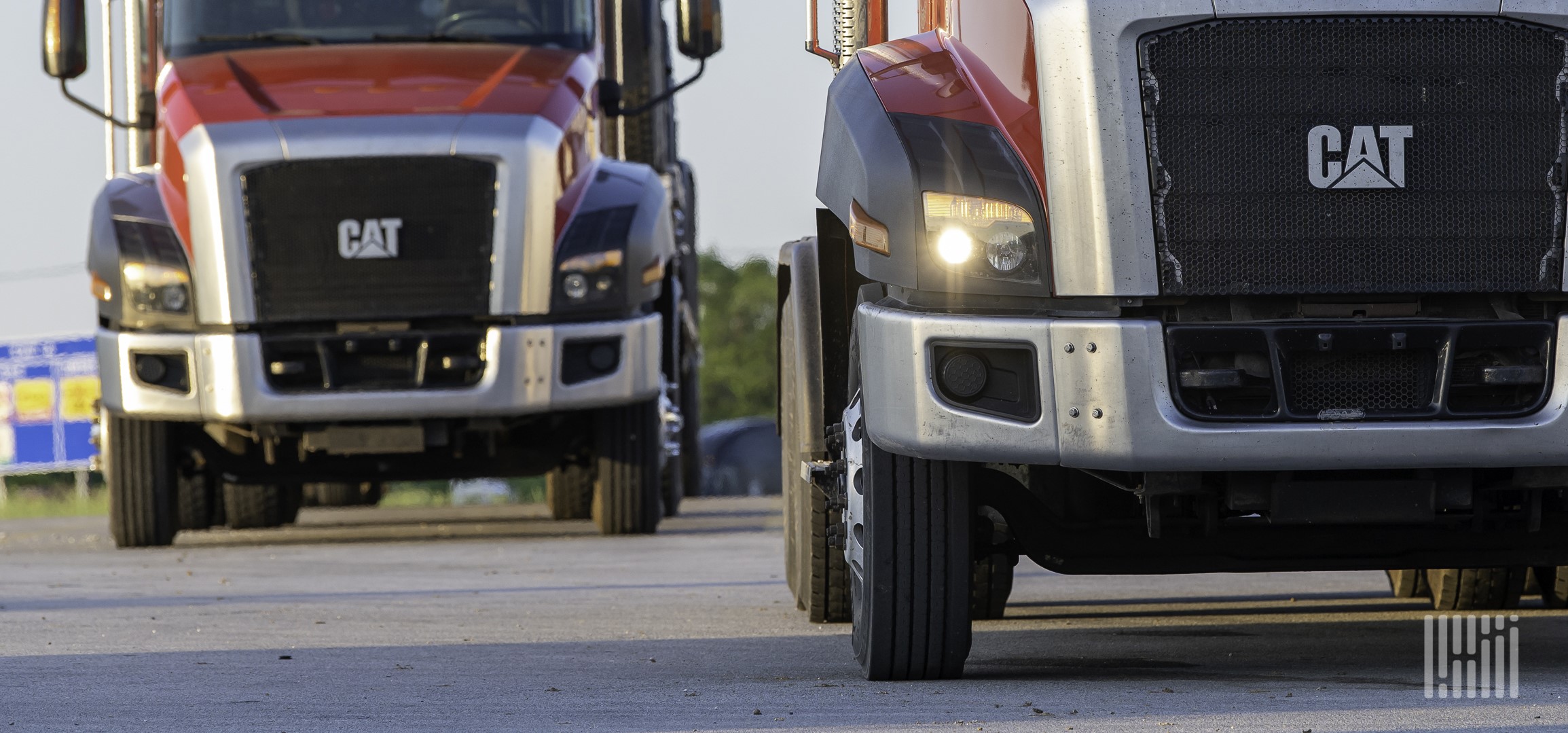Efficiency is the key to success in most industries, and the field of fleet management is no exception. In fact, artificial intelligence-powered (AI) fleet solutions are revolutionizing how companies manage their vehicles and operations.
In this article, we’ll explore how these innovative tools can boost your fleet’s efficiency, and explain five best practices for implementing them.
Key article takeaways
- AI-powered fleet management solutions enhance operational efficiency by providing real-time data analysis for predictive maintenance, route optimization, and driver safety monitoring.
- These solutions benefit a diverse range of organizations, from logistics and delivery services to small businesses with minimal vehicle fleets.
- Successful adoption of AI fleet solutions requires clear goal setting, high-quality data management, proper staff training, starting with pilot programs, and regular performance reviews.
- Emerging trends in AI fleet management include advancements in predictive analytics, better integration with business systems, and a focus on sustainability.
What is a fleet solution?
A fleet solution is a comprehensive system for managing a company’s vehicles. It helps businesses track, maintain, and optimize their fleet operations. These solutions often include software, hardware, and services designed to improve efficiency and reduce costs.
Modern fleet solutions leverage AI to provide deeper insights and automate processes. They can analyze vast amounts of data in real-time. This empowers fleet managers to make informed decisions quickly and efficiently.
What are fleet service solutions?
Fleet solutions encompass a wide range of services designed to support fleet operations. These tools may include:
- Vehicle tracking and telematics
- Maintenance scheduling and management
- Fuel management
- Driver safety monitoring
- Route optimization
- Compliance management
- Asset utilization analysis
AI-powered fleet services can provide more accurate and timely information. They can predict maintenance needs, optimize routes in real-time, and even assess driver behavior. This leads to improved efficiency and reduced operational costs.
Who can use AI fleet solutions?
AI fleet solutions are beneficial for any organization that manages multiple vehicles. This includes:
- Logistics and transportation companies
- Delivery services
- Construction firms
- Utility companies
- Government agencies
- Rental car companies
- Service-based businesses with mobile technicians
Even small businesses with just a few vehicles can benefit from AI-based fleet solutions. These tools can help companies of all sizes improve their operations and bottom line.
How AI makes fleets more efficient
AI increases operational efficiency in several key ways.
Predictive maintenance
AI algorithms can analyze vehicle data to predict when maintenance will be needed. This allows managers to schedule fleet repairs before breakdowns occur. It reduces downtime and extends the life of vehicles.
The system considers factors like mileage, engine performance, and historical data. It can even account for driving conditions and habits, ultimately enabling more accurate maintenance predictions than traditional scheduled servicing.
Real-time route optimization
AI-powered systems optimize routes in real-time taking into account traffic conditions, weather, delivery priorities, vehicle capacity, and more. Fleets benefit from more efficient deliveries and reduced fuel consumption as a result.
Enhanced driver safety
Using AI technologies, like AI dash cams for fleets, managers can monitor driver behavior and provide real-time feedback. By detecting signs of fatigue, distraction, or aggressive driving, fleet managers can proactively address safety issues. The tools can also provide personalized coaching to drivers, which helps them improve their driving habits over time.
Improved fuel management
AI algorithms are able to analyze fuel consumption patterns and identify areas for improvement. They can recommend the most fuel-efficient routes and driving behaviors. This leads to significant cost savings and reduced environmental impact.
Also, by detecting anomalies in fuel consumption, AI solutions can help prevent fuel theft and identify vehicles needing maintenance.
Automated compliance management
AI-powered systems can automatically track and manage compliance requirements. This includes driver hours, vehicle inspections, and documentation. It reduces the risk of violations and associated fines.
When compliance issues are detected, AI tools can alert fleet managers so they can address problems quickly.
5 best practices for implementing AI fleet solutions
To get the most out of AI-powered fleet solutions, follow these steps:
1) Start with clear goals
Define what you want to achieve with your fleet solution. This could be reducing fuel costs, improving safety, or increasing delivery efficiency. Clear goals will help you choose the right solution and measure its effectiveness.
2) Ensure data quality
AI systems rely on high-quality information to function effectively. Implement processes to ensure that your data is accurate and up-to-date. This may entail training staff on proper hardware installation, automating documentation processes, and carrying out regular data audits.
3) Invest in training
Ensure that your team is properly trained on how to use the tools you’re implementing, including fleet managers and drivers. Proper training will help you maximize the benefits of the technology.
4) Start small and scale up
Consider starting with a pilot program before rolling out the solution across your entire fleet. This allows you to test the system and work out any issues on a smaller scale.
5) Regularly review and optimize
AI systems improve over time as they gather more data. Regularly review the system’s performance and make adjustments as needed so you’re always getting the most value from your investment.
Overcoming challenges in AI fleet solution implementation
While AI fleet solutions offer numerous benefits, implementation can come with challenges. Here are some common issues and how to address them:
Resistance to change
Some employees may be resistant to new technology. Address this by clearly communicating the benefits of the system. Involve employees in the implementation process to gain their buy-in.
Data privacy concerns
AI systems collect a lot of data, which can raise privacy concerns. Be transparent about what data is collected and how it’s used. Ensure that your system complies with all relevant data protection regulations.
Integration with existing systems
AI fleet solutions may need to integrate with your existing software. Choose a solution that offers robust integration capabilities. Work closely with your IT team to ensure smooth integration.
Cost concerns
While AI solutions can offer significant ROI, the initial investment can be substantial. Consider the long-term benefits when making your decision. Look for solutions that offer flexible pricing models to fit your budget.
The future of AI in fleet management
As AI technology continues to advance, we can expect even more innovative solutions in fleet management. Some emerging trends include:
- Autonomous vehicles: AI will play a crucial role in the development and management of self-driving fleets.
- Advanced predictive analytics: AI will provide even more accurate predictions for maintenance, route optimization, and fuel management.
- Enhanced integration: AI fleet solutions will integrate more seamlessly with other business systems, providing a holistic view of operations.
- Sustainability focus: AI will help fleets reduce their environmental impact through improved efficiency and support for electric vehicles.
Increase your efficiency with AI fleet solutions
AI-powered fleet solutions offer tremendous potential for boosting operational efficiency and reducing costs. By leveraging these tools, fleet managers can optimize their operations, improve safety, and stay ahead of the competition.
As with any new technology, successful implementation requires careful planning and ongoing management. But with the right approach, fleet solutions like Motive’s AI dash cam can transform your operations and drive significant business value.
Remember, the key to success is to start with clear goals, ensure data quality, invest in training, and continuously optimize your system. With these steps, you’ll be well on your way to realizing the full potential of AI fleet management in no time.
FAQ
Fleet service plays a crucial role in managing and optimizing vehicle operations for businesses and organizations. It encompasses a range of activities including vehicle maintenance, tracking, fuel management, and driver safety, all aimed at improving efficiency, reducing costs, and ensuring regulatory compliance.
AI is used in fleet management to analyze vast amounts of data and provide actionable insights in real-time. It enables predictive maintenance, optimizes routes dynamically, enhances driver safety through behavior analysis, improves fuel efficiency, and automates compliance management, ultimately leading to increased operational efficiency and cost savings.
AI will not entirely replace logistics, but it will significantly transform and enhance the industry. While AI will automate many processes and decision-making tasks, human expertise will remain crucial for strategic planning, handling complex situations, and providing the emotional intelligence needed in customer relations and team management.


